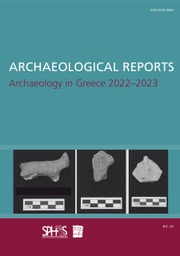Article contents
10 The Marc and Ismene Fitch Laboratory: half a century of interdisciplinary archaeological research
Published online by Cambridge University Press: 30 December 2024
Abstract
This year, 2024, marks the fiftieth anniversary of the Marc and Ismene Fitch Laboratory for Archaeological Science. Since its inception in 1974, this pioneering laboratory has grown from an experiment into a world-renowned hub for archaeological science. As one of the first laboratories of its kind in Greece, and among only a few globally, the Fitch Laboratory expanded its expertise over the decades to encompass a wide range of disciplines. These include archaeobotany, zooarchaeology, human osteology, geophysics, pigment analysis, and its most recognized focus: archaeological ceramics. This paper reviews its history and development, and looks to the future.
Information
- Type
- Article
- Information
- Copyright
- © The Author(s), 2024. Published by Cambridge University Press on behalf of the Society for the Promotion of Hellenic Studies and the British School at Athens
Footnotes
The current paper draws significantly from a previous publication in Greek (Kiriatzi 2022).
References
- 1
- Cited by

